- Home
- Mallory Kane
Death of a Beauty Queen Page 10
Death of a Beauty Queen Read online
Page 10
He searched through the typewritten pages until he found the statement made by Lyndon Banker’s father. Dixon hadn’t forgotten how guilty and grief-stricken the man had been when he’d interviewed him. Eldridge Banker had told Dixon and his partner that he’d thrown Lyndon out of the house the week before.
I was just trying to teach him a lesson, Dixon read from the transcription of the interview. He’d gone through all the money my wife’s mother had left him, and before I realized it and cut him off, he was depleting my accounts and was in hock to a loan shark. Gambling.
This was what Dixon had been looking for. He read through the rest of Banker’s statement but didn’t find any mention of the loan shark’s name.
“Damn it,” he muttered. He turned pages until he came to the report written by Detective James Shively, who’d been his partner when he first joined the homicide division. He quickly skimmed it.
There. He tapped the page. Shively had figured the loan shark Banker had mentioned in his statement was a Gretna, Louisiana, businessman named George Innes. At the time, Innes seemed to have a monopoly on drugs and money around the Touro Bouligny and Irish Channel areas of the city. Shively’s report mentioned that there were a couple of youngsters who were trying to get a foot in the door, seeing as Innes was about to turn eighty.
Shively’s theory was that Rosemary’s fiancé had gotten caught in the crossfire of a turf war.
Dixon sighed and put away the file. He had to get started on those reports if he wanted to get up to Angola today. He made a mental note to check with Shively, who was now retired, about the up-and-coming young loan sharks he’d referred to in his report. Then he’d call Vice and find out who was in charge of loan-sharking these days.
It was after ten before Ethan came in carrying two cups of coffee. Dixon was deep into his fourth report.
“How’d the moving go?” Ethan asked.
“Movie?” Dixon popped the lid on the plastic cup and sipped carefully. It was hot and not too bad.
“Mov-ing. Your sister?” Ethan prompted. “The reason you couldn’t go to the scrimmage Saturday? Which was a great one, by the way. We got to spend some time with Brees.”
“Yeah,” Dixon said, signing off on the report in front of him and picking up another folder. “I hated to miss it.”
“And after the bomb scare, we all went out for wings and beer.”
“Sounds like you had a good time.” Dixon sighed as the hot coffee slip down his throat. He could almost feel the caffeine beginning to work.
“Bull. You’re not paying the least bit of attention to anything I’ve said,” Ethan groused. “And I don’t appreciate your lying to me, either.”
Dixon looked up at his partner. “What’s wrong with you this morning? What are you talking about?”
“There,” Ethan said, spreading his arms in a what-are-you-going-to-do gesture. “I knew you weren’t paying attention.”
Dixon frowned as he replayed Ethan’s remarks. “Did you say something about a bomb?”
Ethan laughed. “Good morning, Dix,” he said wryly, sketching a little bow. “So what were you really doing on Saturday?”
Dixon groaned inwardly as he shrugged. “It was one of those days. Dee called me and told me I didn’t have to help her.” He didn’t like lying to his partner, but he’d started this by claiming his sister needed his help. “So I just kind of goofed off,” he finished lamely.
“In Jackson Square?”
Dixon’s head snapped up. “What?” He felt his ears burning. Damn, he hoped he wasn’t turning red.
“Jerreau saw you. Said he hollered at you and waved, but you were sitting on a bench staring into space.”
Dixon shrugged. “Like I said, goofing around.”
“You could have called me. Come on to the game.”
“I didn’t want to hassle the crowd. I’d have been late.”
Ethan frowned at him. “You knew we were going out after.”
“Come on, Delancey. You know I’m not a big partier.” His attention kept shifting back to the report in front of him.
“Right. I sometimes forget how old you really are.”
Dixon told Ethan what he thought about that remark.
“So what are you up to this morning?” Ethan asked, settling down at his desk.
“As soon as I clear out these reports, I’m headed up to Angola. I want to talk to Pereau some more.”
“Pereau? You mean the skunk who said he’d seen Rosemary?”
Dixon nodded. “I want to see what else he knows. Who he talked to about her.”
“You know you’re around the bend, right? My cousin has been missing for twelve years. Whoever killed her probably dumped her in the river. The Mississippi rarely gives back.”
“You’re not the least bit interested in finding out why a two-bit druggie like Pereau would claim to have seen her? He could have tried to sell you the information, once he found out who you were, but he didn’t.”
“No, because he had enough sense to see that you were the softer touch. I’m telling you, Dix, you’re wasting your time. Any skell off the street hears the name Delancey and there they go. Spinning tales of what really happened. It gets boring after a while.”
“Then I’ll be bored.”
Ethan stared at Dixon pensively. “Why’re you doing this?”
Dixon leaned back in his chair and stretched and yawned. “Damn, I hate doing reports. Makes my neck stiff.” Then he sat back up. “I’ve always wanted to close that case. It was my first as a homicide detective. From what I saw, the killer didn’t have time to kill the fiancé and get back to Rosemary’s apartment and disappear with her.”
“Right. You think she…” Ethan shook his head and huffed.
“I think she walked out on her own. I think she survived.”
“You don’t have one shred of evidence. And I swear, Dix, if you start digging into this and upset my family, you’ll be up to your butt in alligators. Got it?”
“Don’t worry. This is just me. I’m not telling anybody. And I promise you, if this trip leads to nothing, I’ll let it go.” Dixon felt confident in his promise. He was convinced that Pereau knew more than he’d told them, and he planned to squeeze every last drop of information out of the punk.
Chapter Nine
It took Dixon over two hours to drive up to Angola. On the way, he’d called Shively, hoping he still had the same number. He hadn’t talked to his old partner in several months.
After exchanging pleasantries, Dixon told Shively why he’d called. “You said something in your report about a couple of kids nipping at Innes’s heels.”
“Yeah,” Shively said. “There was always a lot of controversy about Innes—where he got all the money he seemed to have access to. Folks had basically two theories.”
Dixon could picture his partner counting off on his fingers. “One, Innes was a front for some truly wealthy SOB who didn’t want to get his hands dirty but liked the return on investment, or two, the money was coming from out of town. Some people thought it might be Tito Vega, who operated on the Mississippi Gulf Coast, but nobody was ever able to pin him down.”
“But Innes was pushing eighty back then. Who took over?”
“I don’t know. There were a couple of guys nipping at Innes’s heels. Seems like I heard they agreed to divide up the territory.” Shively paused. “I’ve got a buddy on the Gretna police force you could call. But seems like an
import from up north named Wasabe was bidding on Touro Bouligny and the Channel.”
“Wasabe?”
“Yeah. I forget his first name. Allen or Aaron or something like that. I think he owns an accounting firm somewhere on Tchoupitoulas. So,” Shively said, “what’s got you dredging up ancient history?”
Dixon explained as much as he could without giving Shively any specifics.
“You know, it’s odd,” Shively said. “That case was your first homicide, and it was nearly my last.”
Dixon knew exa
ctly what Shively was talking about. A few months later, as he and Shively were working a faked suicide, Shively was shot. After he recovered, he sat at a desk for about a year, then retired.
“For some reason,” Shively went on, “it stuck with me. All that blood on the floors, the bed, the bathtub.”
“Yeah,” Dixon said, his mouth twisting wryly. “It stuck with me, too.”
After another minute or so of catching up, Dixon thanked Shively and hung up, promising to get by to see him and have a beer soon. It was after two by the time he found himself waiting at one of the tiny scarred tables in the visitation room.
When the guard brought T-Bo Pereau in, and he spotted Dixon, the wiry Cajun’s swarthy face turned a sickly green. He balked, but the guard half dragged him over and pushed him down in the chair.
Dixon met the guard’s eyes and angled his head dismissively, then turned to T-Bo. “Afternoon,” he said cheerily.
T-Bo was half-turned in his chair, not looking at Dixon. He tried to speak without moving his thin, pinched lips. “What you call me out here for, eh? Folks see me talking wit’ you, I’ll be dead for sure.”
“Then you might want to hurry up and tell me what I need to know.”
“I told you everything already. Dat’s all I know.”
T-Bo’s color was returning a little, but sweat rolled down his face, despite the air-conditioned room. He sent a narrow sidelong gaze toward the cardboard package Dixon carried.
“That whole carton for me?” he asked.
Dixon always brought cigarettes with him to Angola. Cigarettes were like money to the inmates. He tapped the top of the carton with his fingertips.
T-Bo’s black eyes glittered. “Now dat’s what I’m talking about,” he said, reaching for it.
But Dixon held back. “Information first.”
T-Bo folded his arms and sat back in his chair. Still without looking at Dixon, he said, “I got to act like I’m not talking to you. You don’t know, man. You might have on dat white shirt and three-dollar tie, but there ain’t a soul in here can’t smell the cop stink on you.”
“Fine,” Dixon replied. “I’ll try to act like I can’t get anything out of you, but I swear, if you don’t start talking, I’ll make sure everyone in this room knows just how incredibly helpful you’re being.”
T-Bo lifted his chin stubbornly. From his body language, one could get the idea that he’d decided that no matter what the guards or the man across from him might threaten or do, he wasn’t talking. “So spit it out, man,” he said, trying not to move his lips. “Whatcha want to know?”
“How’d you find out about Rosemary Delancey? I know you didn’t recognize her yourself.”
T-Bo shrugged. “Sure, I did.”
“I swear, T-Bo, I’ll hug you.”
“Okay, okay.” T-Bo glanced furtively around and squeezed his arms more tightly together. “This buddy of mine—met him when we were in-carcerated together, you know. He spotted her. Told me he knew soon as he saw her that she was the Delancey girl that went missing. Said he ain’t never saw no one walked like that.”
A chill slid down Dixon’s spine. T-Bo was telling the truth. He knew because he’d never seen anyone walk like Rose did, either. Her walk was regal. She even walked across her own living room as if she were Carnival Queen. To him, that walk was sexy as hell.
“I said you talking crazy,” T-Bo went on. “You don’t know no Delancey. Then he said, naw really. Said his daddy escorted her at the Ti Malice Ball when she was Carnival Queen.”
T-Bo forgot he was supposed to be ignoring Dixon. He turned toward him and leaned forward. “Said he was like twelve, and every time he looked at her he got a—”
Dixon held up his hand. “Come on, T-Bo. You expect me to believe you were in the joint with a Mardi Gras king’s son?”
“Yeah, man. His daddy is some big muckety-muck. City council maybe?” T-Bo nodded. “Yeah, city council.”
Dixon pinned the little Cajun with a disbelieving look. “How’d this big muckety muck’s kid end up in prison with the likes of you?”
“Hit and run. DWI. His papa wouldn’t bail him out. Said he needed to learn a lesson.”
Dixon shifted. That information sounded familiar. “I still haven’t heard a name. Who’s your friend, T-Bo? I’m about to start thanking you for all your great information, and I won’t be whispering.”
T-Bo leaned back and crossed his arms again. He sent a guarded glance around the room. “Cigarettes,” he said.
Dixon pushed the carton across the little table.
“Junior Fulbright,” T-Bo mouthed. “Now get outta here.”
It took Dixon a second to process the name. “The councilman’s son?” he asked.
T-Bo shrugged. “I reckon.”
James Fulbright was a city councilman known to be hard on crime. So hard that he’d let his son serve time for a DUI. Again, Dixon felt a chill. T-Bo’s information was too on-target. He was telling the truth.
“Who all did you tell about her?”
T-Bo’s eyes went dull. “Nobody.”
“You’re a lying snake,” Dixon said. “Stand up. I need to give you that hug for all the great information you’ve given me.”
“There might have been a couple people standing around when Junior was talking.”
Dixon shifted. “I swear on my mama’s grave—”
“Okay! Sure!” T-Bo hissed. “I swear I don’t know who all was around, but Junior wasn’t quiet about it. He was high and dying to brag. Said he might try to sell the info. Said whoever tried to kill her back then would want to know where she was.”
“Where’d this conversation take place?”
“Down on Bourbon, corner of Rampart. And that’s all I know.” He shoved his chair back violently and grabbed the cigarettes. “I told you to leave me the hell alone. You couyon. I ain’t talking to the likes of you.”
Dixon rose and frowned menacingly. “Give me back those smokes, then.”
“Hell no. You gave ’em to me, fair and square.”
A guard started their way, but Dixon waved him off with a brief shake of his head. He wanted to make this good, for T-Bo’s sake.
“Fine, T-Bo. Enjoy them,” he said, nodding at the carton. “Because it’s the last you’ll get.” At that he turned on his heel and gestured to the guard. “Take me to the warden. I need to talk to him about revoking some privileges.”
* * *
AFTER THE TWO-HOUR drive back to the precinct, Dixon found a sheet of paper on his desk. It was the fingerprint report from the cigarette lighter the punk dropped the other day when Dixon chased him. The prints belonged to a James Fulbright Jr. Dixon whistled softly.
Then he touched his mouse and entered James Fulbright Jr.’s name into the system. When the profile page came up and Dixon saw the photo, Dixon whistled again. “I will be damned,” he whispered. “Hello, Ponytail.”
The photo was of a young man, early twenties, with spiked dirty blond hair. He was definitely the punk who had followed Rose on the streetcar, and the fingerprints on the cigarette lighter confirmed it.
So Junior was gathering information about Rose, which he planned to turn around and sell to whoever showed the most interest. Dixon turned his attention to Junior’s rap sheet. Skimming it quickly, he saw several DUIs, a couple of disorderly conducts and even one resisting arrest.
He thought about Junior’s dad. City councilman James Fulbright was known to be hard on crime. So when Junior finally hit somebody while driving drunk, Daddy Fulbright let him go to the slammer. A cold move, given the state of the prisons in Louisiana.
Dixon searched online until he came up with a photo of Rosemary with James Fulbright all dressed up with crowns and robes during Mardi Gras, 1999. He remembered talking to Fulbright back then. The councilman had praised Rosemary, saying she was a sweet girl and he couldn’t imagine why anyone would want to harm her.
Dixon looked at the councilman’s face. Just how far would he go to further his figh
t against crime in the city? He’d let his own teenaged son spend time in prison. Could he have targeted Lyndon Banker, hurting Rosemary because she was in his way? It was something to think about.
But right now, he needed information on Junior’s whereabouts. He wanted to speed over to the Fulbrights’ home and demand the information, but that probably wouldn’t be a good idea, especially if he used his official capacity to get the information. No, when he talked to Councilman Fulbright, he’d do it on his own time, and he wouldn’t mention Rosemary Delancey.
He printed a copy of Junior’s photo. Just as he grabbed it off the printer, Ethan came in.
“You missed a good one,” Ethan said.
“Yeah?” he responded as he folded up the sheet of paper and stuck it in his jacket pocket.
“We had a jumper on the Riverwalk.”
Dixon looked up. “A jumper. No kidding?”
“Yeah. For a while I wasn’t sure we could stop her. She was young—early twenties at the outside. Apparently she found out her parents paid off her boyfriend to leave her alone—and he took the money.”
“How’d you talk her down?”
Ethan flopped down in his desk chair and stretched. “I’ll tell you how. Because you left me here on my own, when the call came in, the lieutenant paired me with Burgess.”
Dixon didn’t speak, just nodded, biting the inside of his cheek to keep from laughing. Mary Burgess was a ten-year veteran known for being tough on crime, tougher on her partner and toughest on herself.
“How did that go?” Dixon asked.
“Good. Really good. Surprised the hell out of me. She talked the girl down. She was…sweet.”
“Burgess? Sweet?”
“Yeah. Go figure,” Ethan said. “So what did you find out on your fishing expedition to Angola?”
Dixon handed Ethan the photo of Junior Fulbright he’d just taken off the printer.
“Who’s this?” Ethan asked, although the photo was footnoted with name and date of birth.
“Junior Fulbright.”
“The city councilman’s son.” It wasn’t a question. “Not surprised. He can’t stay out of trouble to save his life.” Ethan handed the picture back to him. “What’s Junior got to do with your BFF Pereau?”

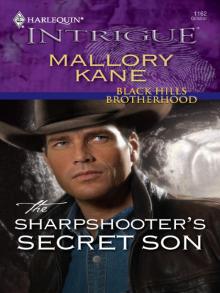 The Sharpshooter's Secret Son
The Sharpshooter's Secret Son Detective Daddy
Detective Daddy Special Forces Father
Special Forces Father Blood Ties in Chef Voleur
Blood Ties in Chef Voleur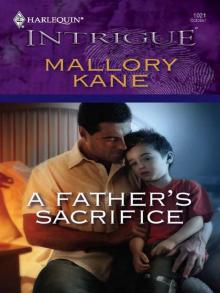 A_Father's Sacrifice
A_Father's Sacrifice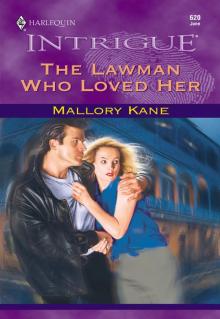 The Lawman Who Loved Her
The Lawman Who Loved Her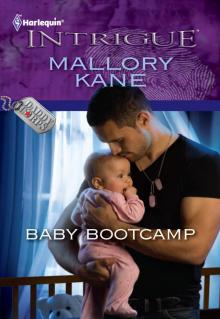 Baby Bootcamp
Baby Bootcamp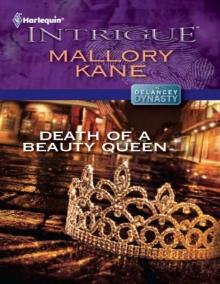 Death of a Beauty Queen
Death of a Beauty Queen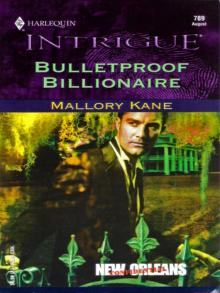 Bulletproof Billionaire
Bulletproof Billionaire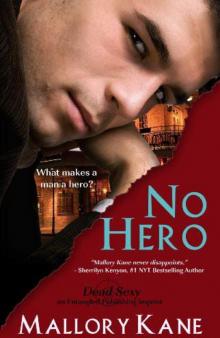 No Hero
No Hero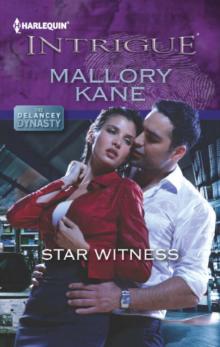 Star Witness
Star Witness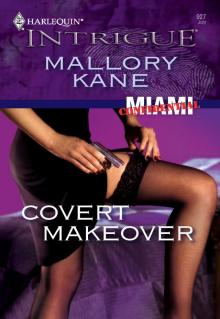 Covert Makeover
Covert Makeover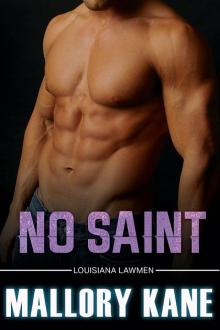 No Saint
No Saint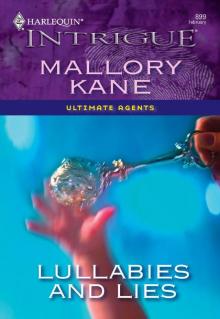 Lullabies and Lies
Lullabies and Lies The Colonel's Widow?
The Colonel's Widow? Seeking Asylum
Seeking Asylum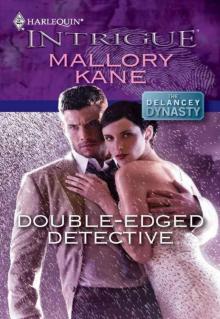 Double-Edged Detective
Double-Edged Detective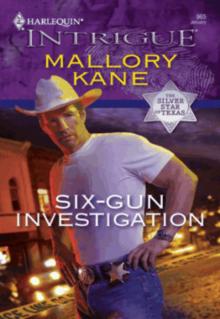 Six-Gun Investigation
Six-Gun Investigation His Best Friend’s Baby
His Best Friend’s Baby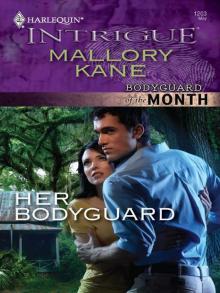 Her Bodyguard
Her Bodyguard Bodyguard/Husband
Bodyguard/Husband Time Rider (Rise of the Skipworths)
Time Rider (Rise of the Skipworths) It's In His Kiss
It's In His Kiss Ultimate Agents - High School Reunion
Ultimate Agents - High School Reunion The Pediatrician's Personal Protector
The Pediatrician's Personal Protector Private Security
Private Security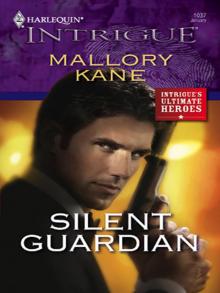 Silent Guardian
Silent Guardian September Rain
September Rain Heir to Secret Memories
Heir to Secret Memories High School Reunion
High School Reunion